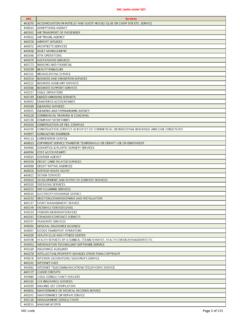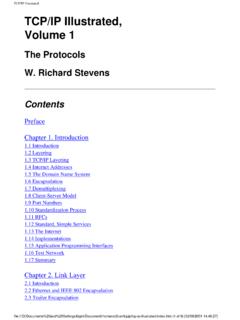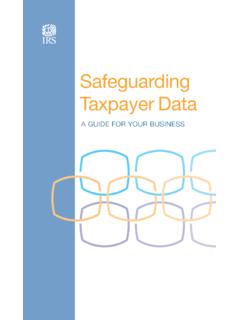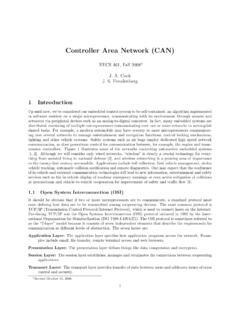Transcription of Reflections on Academic Honesty and Integrity
1 American Journal of Business Education August 2009 Volume 2, Number 5 75 Making The Case For The Creation Of An Academic Honesty And Integrity Culture In Higher Education: Reflections And Suggestions For Reducing The Rise In Student Cheating Frank J. Cavico, Nova Southeastern University, USA Bahaudin G. Mujtaba, Nova Southeastern University, USA ABSTRACT Using an example from the work of one university in the United States, this case is principally an essay of Reflections , thoughts, questions, and suggestions for the creation of an Academic Honesty and Integrity culture in higher education institutions. The authors provide their thoughts and insights from their combined 30 years of teaching and administration experiences regarding this important and challenging Academic area. The authors were recently involved in the revision of their business school s Academic Honesty policy as well as in their school s yearly conference for all faculty members full-time and adjunct in which the topic of Academic Honesty was the primary Academic component.
2 This article is not intended to be a research type article, though some current research on Academic Honesty will be presented, neither is it intended to be a detailed explication of the authors school s Academic Honesty policy, nor a how to article when it comes to a school s developing and implementing Academic Honesty policies and procedures. Rather, as the word Reflections in the article s title indicates, this paper is based on the knowledge gained by the authors in their school s revision of its policy, their participation in the conference and the presentations therein, as well as the authors own experiences from teaching management, business law, and business ethics courses for many years. The authors hope that the issues they raise, the insights they obtained, and the recommendations and suggestions they make will be helpful to their colleagues in academia in establishing a culture of Academic Honesty and Integrity at their schools.
3 Keywords: cheating, plagiarism, Academic Honesty , higher education, assessment of education, faculty conference, student monitoring THE IMPORTANCE OF AN Academic Honesty CULTURE he foundation to the Academic Honesty policy is the school s commitment to the values of ethics, Integrity , and Honesty , The H. Wayne Huizenga School of Business and Entrepreneurship s first precept in its Guiding Principles and Philosophy is that we are driven to Conduct all our Academic affairs with Integrity . Accordingly, the school must clearly communicate the institution s expectations regarding ethics, Integrity , and Academic Honesty , so the administrators must take Academic misconduct very seriously. One goal is to link Academic Honesty to personal, business, and professional success. This goal is similar to the objective of the school s law and ethics courses; that is, to link legal and ethical behavior with personal and business success.
4 It is imperative that a link be established between Academic Honesty and ethics and Integrity and long-term personal, business, and career success. The intent of the Academic Honesty policy is not merely to be the police of Academic violations, but rather to create a culture and climate at the school that emphasizes, and is more conducive to, Academic Honesty . Yet, when the faculty and administration are the police, they must make sure that Academic T American Journal of Business Education August 2009 Volume 2, Number 5 76 misconduct is proceeded against pursuant to the Academic Honesty code in a fair and consistent manner. As such, the faculty and administration must avoid any enforcements that appear arbitrary and capricious or inequitable and unjust. Another critical point to make is that when the faculty does uphold and enforce policy, the faculty must have the complete and total support of their faculty colleagues, the program offices, the administration, and particularly the deans of the school.
5 The authors of this essay do make an assumption; that is, that most people, including the students, of course, are moral and ethical. Thus, they want to do the right things and make the right decisions. However, the authors are very well cognizant of the old Cold War saying: Trust but verify. THE WIDESPREAD CULTURE OF CHEATING In today s school environment, there has been an influx of reports and news concerning student cheating and dishonesty (McGill, 2008). Having an environment where cheating is perceived as a necessity is not a good form of conditioning and preparing students for the real world (Mujtaba and Preziosi, 2006). Young students eventually end up running schools, governments and corporations, where cheating, as clearly evidenced by the economic crisis of 2008-2009, is not productive for society. As such, innovative and new measures must be taken to reduce cheating among students by showing them a better way and also by removing their need for resorting to such tactics.
6 Fortunately, there are dedicated faculty members that attempt to reduce dishonesty and cheating in the classroom by being persistent and innovative. Innovative techniques are important and emphasized because there are no cookie cutter approaches to stop all practices of cheating. While cheating is not necessarily created at the college level, the cultures of institutions might further reinforce it. On April 29, 2004, ABC s (American Broadcasting Corporation) Prime Time had a segment on cheating of students in the education system. They tackled the issue of cheating in colleges and high schools. They found that 75% of students admitted to cheating on an exam or paper. This Prime Time segment titled Caught Cheating in School was a six-month study of college and high school students about cheating practices and the reasons why they cheat.
7 The research, claiming that cheating is at an all time high, was facilitated and narrated by Charlie Gibson. Of the 12,000 college students, 75% admitted that they have cheated on an exam or term project (Mujtaba and Preziosi, 2006). These students said that they know cheating is wrong, but they do it in order to be better prepared for real life in the business world where cheating and manipulating the system to get ahead seems to be the norm. Students are using calculators, cell phones, computers, and other devices to store and/or download relevant information to complete the exam. Many schools have wireless access to the Internet and students are fully able to use this system to download the answers and cheat very easily. One student was timed by Charlie Gibson to see how long it took her to get the answer for one of the questions from another student using her cell phone s text messaging function.
8 It took her less than 30 seconds, using one hand under table, to ask the question and receive the answer while the other hand seemed to be attempting to take the test. Furthermore, ABC s poll concluded that 36% of high school students admitted that they had cheated and 7 out of 10 students say that their friends have cheated. Researchers on the show stated that business administration students are the top cheaters in self-reported surveys. They tend to rank first or second among the highest cheaters. Some students feel that they need to cheat since their counterparts are doing it. Others feel that they need to cheat as the school system is simply a dress rehearsal for the cut throat world of business. Many students feel that if senior business officers or religious leaders cheat and politicians, including governors and presidents, lie, then they, too, have the right to cheat and get ahead using tactics available to them.
9 Some of the students tend to see the school system as their laboratory for experimentation and learning to manipulate employees, colleagues, and other stakeholders for their own personal gain. Ethics consultant, Michael Josephson, stated that students feel as though it is okay to cheat since professors allow it. There is nothing wrong with the students since they simply think they will get behind if they do not do what they are allowed to do in order to have high performance. In a survey of 4,000 American and Canadian school educators, about 50% stated they have ignored obvious cases of cheating. As such, adults must be aware of cheating methods, stop cheating, teach students that cheating is wrong, and tell them that cheaters will be punished. In one case, a college professor found that about a half dozen of his students had cheated from an online site where information was prepared and presented by fifth grade students.
10 It is sad to see that college students do not have American Journal of Business Education August 2009 Volume 2, Number 5 77 time to prepare their own material but rather are plagiarizing from fifth graders. They feel that they have to keep up their grade point average (GPA) since college recruiters tend to hire those with high GPAs. Some students feel they must cheat since there is too much work for them to complete in such a short period of time. However, others thought it is the fault of the teachers for not punishing those who cheat. During one experiment, students were caught cheating by checking their papers in the website to see how many of the submitted papers were plagiarized. is one tool that many educators use to catch cheaters. It can scan about 15,000 papers submitted by educators every day. tells the faculty what is copied from other sources and what percentage of each paper is directly copied from these sources.













